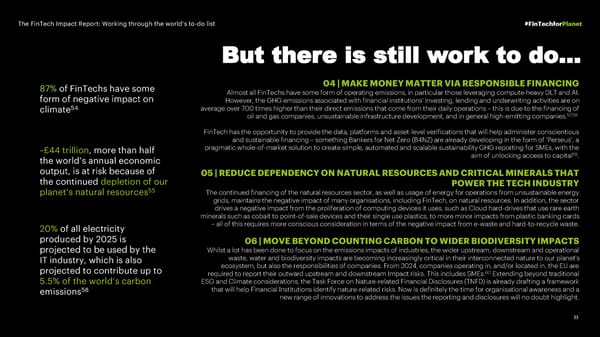The FinTech Impact Report: Working through the world’s to-do list #FinTechforPlanet But there is still work to do… 87% of FinTechs have some 04 | MAKE MONEY MATTER VIA RESPONSIBLE FINANCING form of negative impact on Almost all FinTechs have some form of operating emissions, in particular those leveraging compute-heavy DLT and AI. However, the GHG emissions associated with financial institutions' investing, lending and underwriting activities are on climate54 average over 700 times higher than their direct emissions that come from their daily operations – this is due to the financing of oil and gas companies, unsustainable infrastructure development, and in general high-emitting companies.57,58 FinTech has the opportunity to provide the data, platforms and asset-level verifications that will help administer conscientious and sustainable financing – something Bankers for Net Zero (B4NZ) are already developing in the form of ‘Perseus’, a ~£44 trillion, more than half pragmatic whole-of-market solution to create simple, automated and scalable sustainability GHG reporting for SMEs, with the 59 aim of unlocking access to capital . the world’s annual economic output, is at risk because of 05 | REDUCE DEPENDENCY ON NATURAL RESOURCES AND CRITICAL MINERALS THAT the continued depletion of our POWER THE TECH INDUSTRY planet’s natural resources55 The continued financing of the natural resources sector, as well as usage of energy for operations from unsustainable energy grids, maintains the negative impact of many organisations, including FinTech, on natural resources. In addition, the sector drives a negative impact from the proliferation of computing devices it uses, such as Cloud hard-drives that use rare earth minerals such as cobalt to point-of-sale devices and their single use plastics, to more minor impacts from plastic banking cards 20% of all electricity – all of this requires more conscious consideration in terms of the negative impact from e-waste and hard-to-recycle waste. produced by 2025 is 06 | MOVE BEYOND COUNTING CARBON TO WIDER BIODIVERSITYIMPACTS projected to be used by the Whilst a lot has been done to focus on the emissions impacts of industries, the wider upstream, downstream and operational IT industry, which is also waste, water and biodiversity impacts are becoming increasingly critical in their interconnected nature to our planet's projected to contribute up to ecosystem, but also the responsibilities of companies. From 2024, companies operating in, and/or located in, the EU are 60 required to report their outward upstream and downstream Impact risks. This includes SMEs. Extending beyond traditional ESG and Climate considerations, the Task Force on Nature-related Financial Disclosures (TNFD) is already drafting a framework 5.5% of the world’s carbon emissions56 that will help Financial Institutions identify nature-related risks. Now is definitely the time for organisational awareness and a new range of innovations to address the issues the reporting and disclosures will no doubt highlight. 33
 The FinTech Impact Report: Working through the world’s to-do list Page 32 Page 34
The FinTech Impact Report: Working through the world’s to-do list Page 32 Page 34